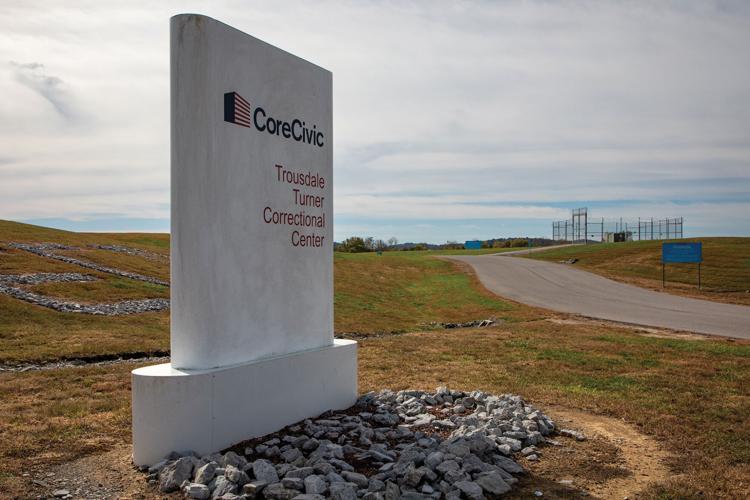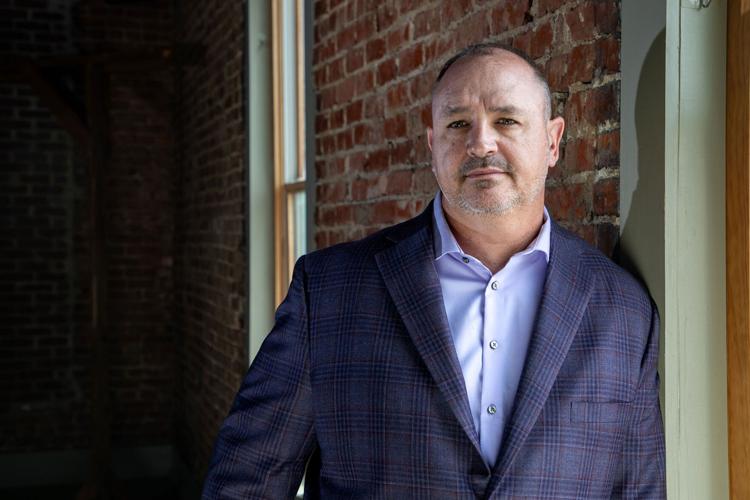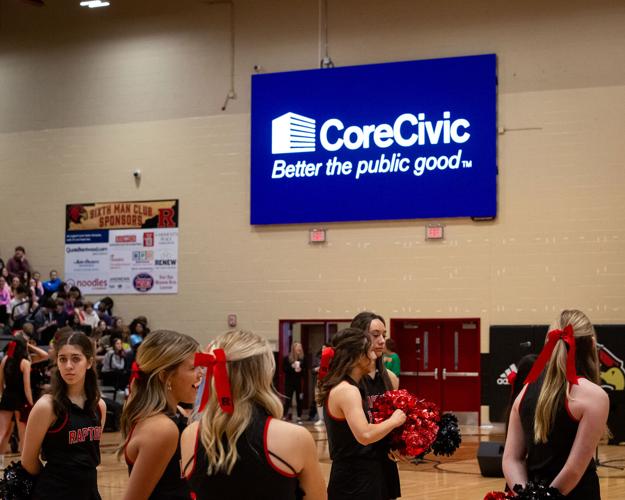Fifty years ago, private prisons largely didn’t exist.
While early forms of for-profit prisons first began operating in the U.S. during the 19th century via prison labor and convict leasing, state, local and federal governments were the primary entities to wield control of the country’s penal institutions. Then, in the early 1980s, mass incarceration began to skyrocket as a result of President Ronald Reagan’s acceleration of the “war on drugs” and “tough on crime” policies.
Meanwhile, the state-run prison system in Tennessee was in a period of turmoil marked by overcrowding and violence that led to the system being placed under federal supervision. As a result, a trio of Nashville businessmen sought to take an entrepreneur’s approach to address these issues.
Tom Beasley, a previous chairman of the Tennessee Republican Party, teamed up with Nashville real estate executive Robert Crants and businessman T. Don Hutto. Hutto’s career in prisons began in the 1960s when he was the warden of a Texas prison’s cotton plantation that primarily relied on the labor of Black incarcerated people, as reported by Time magazine.
In 1983, the three men formed the Corrections Corporation of America — making Tennessee the birthplace of the for-profit prison industry. The corporation’s ties to some of Middle Tennessee’s largest and most powerful businesses began at its inception. Jack Massey, co-founder of the Hospital Corporation of America (now known as HCA Healthcare) made the initial investment into the company, which also received early support from Vanderbilt University.
Steve Norris was commissioner of the Tennessee Department of Correction from 1985 to 1988, and during his tenure CCA began to seriously approach the state with its idea to privatize the corrections system. In 1985, CCA presented the state with a $250 million proposal to fully take over the Tennessee prison system — an effort that received support from then-Gov. Lamar Alexander but was eventually rejected by state lawmakers.
Norris tells the Scene he was initially skeptical of the offer — not necessarily because he’s opposed to private prisons, but because of the numerous financial questions raised by the idea.
“My first reaction was, ‘I’m not sure how you do that,’” Norris says. “It was quite a proposal.”
“How do you buy a state-owned corrections system?” Norris says. “How do you value it? What’s the value of the real estate? What happens to the employees? How do you value the assets? How would you establish a price for that?”
He maintains that there is an opportunity for private prisons to function effectively, but only if they are operated correctly.
“I’m not philosophically opposed to [private prisons], done well,” Norris says. “They can certainly add capacity to state prison systems and play a role. But it has to be done correctly.”
While the bid to buy out Tennessee’s entire prison system failed during a special session of the state legislature, a notable provision was passed by lawmakers during that session: a law that says the state can have only one contract with a privately run prison. CCA signed a contract with the state to open its first Tennessee prison in 1992: the South Central Correctional Facility in Clifton. In May of this year, the state renewed its contract with the prison for $168 million and for three years.
Following a heated town meeting, one elected representative is calling for an investigation into the conduct of other officials
Over the past three decades, the company began to circumvent the state law restricting Tennessee to a single private prison by signing contracts directly with local governments in the counties where it sought to place its facilities — often in small rural towns where a large prison can offer much-needed job opportunities.
Now the company operates three other prisons in the state: Trousdale Turner Correctional Center in Hartsville, as well as Hardeman County Correctional Facility and Whiteville Correctional Facility, both in Whiteville. For more than 25 years, CCA operated Nashville’s Metro Detention Facility before ending its contract in 2020 — an effort that was in part pushed for by Mayor Freddie O’Connell, who served as a Metro councilmember at the time.
CCA rebranded as CoreCivic in 2016, adopting the tagline “Better the public good.” Over the past 40 years, the publicly traded company has grown into a multibillion-dollar business operating dozens of facilities across 21 states. Its contracts in Tennessee bring in hundreds of millions of dollars annually. In 2024, the company’s total revenue was $2 billion, with a net income of $68.9 million.
CoreCivic’s latest profit surges have come from its contracts with U.S. Immigration and Customs Enforcement to open immigration detention facilities, including a recent contract with the West Tennessee town of Mason.

CoreCivic headquarters in Brentwood
In 2019, CoreCivic relocated its headquarters — from Nashville’s Green Hills neighborhood to a nondescript office park building in Brentwood. There’s little signage to denote the massive operator’s presence.
CoreCivic remains deeply intertwined with state and national politics. The company’s political action committee and its current CEO donated to President Donald Trump’s 2024 presidential campaign and funneled hundreds of thousands of dollars to Trump’s inauguration committee. Gov. Bill Lee, U.S. Sen. Marsha Blackburn, Lt. Gov. Randy McNally and state House Speaker Cameron Sexton are just a few of the most prominent names in Tennessee politics to accept tens of thousands of dollars in campaign contributions from the company.
While CoreCivic has poured millions of dollars into conservative causes, Democrats have also been beneficiaries of the company’s campaign spending. The group has donated small sums to the Tennessee House and Senate Democratic caucuses. Democratic state Rep. Johnny Shaw of Bolivar — who has two CoreCivic prisons in his district — has received more than $13,000 from the private prison operator. State Sen. Jeff Yarbro, a Nashville Democrat, accepted $1,000 from CoreCivic in 2022, according to nonpartisan database OpenSecrets.
“I can’t speak for other legislators, but for me, letting contributions dictate the positions you take would be bribery," says Yarbro, who has been openly critical of CoreCivic in recent months and years. "And I think both my record and my often-disappointed contributors would confirm that I’m not a reliable vote just because some PAC cuts me a check.”

Ravenwood High School, 2024
Outside of politics, CoreCivic has cemented its presence in the Nashville business and nonprofit landscape, where it routinely sponsors community events across Middle Tennessee, including those held by the Nashville Area Chamber of Commerce and the United Way of Greater Nashville. Strangely, the private prison operator has been a sponsor of Brentwood’s Ravenwood High School marching band. Cheekwood Estate & Gardens has also taken money from the prison operator, which led to resignations from at least two staff members earlier this year.
On Oct. 2, the CoreCivic Foundation hosted its 34th annual Golf Classic at the Hermitage Golf Course. The event raised $1 million for 72 nonprofits that support justice-involved initiatives. Included among this year’s beneficiaries were Dismas House, Big Brothers Big Sisters of Middle Tennessee and area affiliates of Court Appointed Special Advocates for Children, commonly known as CASA.
A History of Violence
In recent years, CoreCivic’s reputation in Tennessee has been plagued by reports of physical and sexual assault, riots, killings, gang violence, overdoses and extortion, among other human rights violations in its facilities, which face understaffing, mismanagement and high rates of staff turnover.
Legal complaints cite civil rights violations, understaffing and mismanagement at facilities run by the massive Brentwood-based operator
One man formerly incarcerated in Trousdale Turner spoke with the Scene under the condition of anonymity, saying he still fears gang members inside the facility. He says he feared for his life while at Trousdale Turner and witnessed numerous fights, assaults and a riot in his nearly two years there. He details neglect by the facility’s medical staff and says he faced issues filing grievances, which he says went unanswered. These all mirror complaints referenced in the hundreds of lawsuits the corporation and its executives have faced in recent years.
“[Trousdale Turner] was the most violent, dangerous place you could imagine,” he says. “It’s a nightmare.”
The Scene spoke with numerous family members of those incarcerated at CoreCivic facilities, as well as a former CoreCivic prison employee who cites similar concerns of corruption, lack of transparency and absence of accountability.
Dana Riner is the mother of Elijah Crosswhite, who was incarcerated in Trousdale Turner. Riner says her son came out of the facility unrecognizable to her after being held in isolation for two years, developing mental health complications and receiving little to no treatment or evaluations. She says he has since been diagnosed with schizophrenia. Since Crosswhite was released last year, Riner has spent much of her time advocating for better conditions at Trousdale Turner and for an end to CoreCivic’s operations in Tennessee.
“I see too many people saying stuff like, ‘Well, they did the crime, they gotta do the time,’” Riner tells the Scene. “They are doing their time, but nobody deserves to have their civil rights violated like that.”
“We’re not saying they need fluffy pillows and blankets,” Riner adds. “We’re talking about basic human rights here — food, water, safety, not being raped, not being beat up, not being threatened.”
Trousdale Turner is Tennessee’s largest prison and has become known as the most dangerous facility in the state, harboring conditions so heinous that it’s currently the subject of an investigation by the U.S. Department of Justice. The investigation was launched in 2024, though its status has been in limbo since the Trump administration took over.
Allen Beard Jr. is the eighth warden in nine years at the Hartsville private prison
Trousdale Turner has shuffled through eight wardens in the past nine years and was the scene of a riot in June that resulted in injuries to correctional officers and the incarcerated. Since the riot, about 500 people have been moved out of the facility. According to TDOC Commissioner Frank Strada, the riot was the result of shortfalls by Trousdale Turner correctional officers — not CoreCivic. Strada addressed the state Senate’s State & Local Government Corrections Subcommittee on Oct. 1, continuing to call CoreCivic a “good partner” — a phrase that’s been reiterated by state officials over the years.
Family members of people incarcerated in CoreCivic prisons say they have faced roadblocks when trying to communicate or get basic information from officials at CoreCivic and TDOC. In light of these obstacles, many have turned to Facebook pages and groups to search for some semblance of an answer about what’s happening to their loved ones inside the facilities. Pages like “Trousdale Turner - Close It Down” and “CoreCivic-Trousdale Turner … justice for our loved ones” host thousands of followers who share their experiences dealing with the prison system.
Many of these family members express the same sentiment: They want the state of Tennessee to cut all ties with CoreCivic. Some say they either try to avoid or boycott any businesses or nonprofits that accept donations from the company.

Tim Leeper
Steps Toward Solutions
Born out of these instances of violence and decades of unrest inside CoreCivic facilities are stories of people advocating for tangible changes to the methodology in which Tennessee’s prisons are currently operated.
One of those people is Lebanon resident Tim Leeper, whose 25-year-old son Kylan died from an overdose in Trousdale Turner in 2023. Since his son’s death, Leeper has made it his life’s work to advocate for prison reform in Tennessee, stepping away from his job in roofing to launch the nonprofit organization Kylan’s Light.
He says the goal of his organization is to not only spread awareness about the conditions inside CoreCivic facilities, but also to promote opportunities for rehabilitation in prisons.
“I really want to work to make sure that our state begins to change the views we have of our offenders by giving them the dignity, the rehabilitation, the reintegration process, to give them the tools to be successful,” Leeper says. “And that’s going to be a gradual change … because we have so often looked at offenders like the monsters under the bed.”
The chief method of instituting change when it comes to Tennessee’s corrections system is going through the state legislature. Leeper testified before a state Senate committee earlier this year, which in part helped pass a law that reduces CoreCivic’s prison populations if death rates in the prisons continue to rise.
That bill was sponsored by state Sen. Mark Pody (R-Lebanon), who has sponsored several pieces of prison reform legislation. While Pody turned down the Scene’s request for an interview, he says he’s working on additional legislation for the upcoming session. He declined to share details of what the policy will entail.
CoreCivic inmate populations at facilities company operates could be cut if deaths continue
At a town hall event in September that focused on prison reform, Pody said reinstituting a Corrections Oversight Committee within the legislature could be a possible step toward ensuring accountability for corporations like CoreCivic. This type of committee was first created in Tennessee around the time CoreCivic was founded and operated until it was eliminated in 2011.
“There were a lot of oversight boards that we did away with about a dozen years ago, and we’re in the process of looking back to say, ‘Did we make some mistakes?’” said Pody at the town hall. “I think we did.”
CoreCivic has contributed $6,750 to Mark Pody’s campaigns since 2011, according to OpenSecrets.
State Rep. Clark Boyd, another Lebanon Republican, has co-sponsored prison reform legislation with Pody and also spoke at the town hall, where he said Democrats and Republicans generally agree that the private prison system has its share of issues.
“What I found was, nobody likes private prisons,” Boyd said in September. “Once I stepped forward and started carrying legislation, it was unanimous. Every committee we went to, it was 100 percent of the Republicans, 100 percent of the Democrats. We were lockstep … that we all agree that there’s a problem and we need changes.”
Leeper hopes reform legislation will be passed in the 2026 session of the Tennessee General Assembly. Specifically, he wants to see body cameras being used by all correctional staff and the creation of what he calls “prison alternative camps” for people 18 to 24 years old who have committed nonviolent crimes. There young adults would be given rehabilitative tools and mental health treatment options. Better transparency and communication for family members of those incarcerated and standardization of both public and private prisons in the state are also top of mind for Leeper as he approaches the upcoming session.
Democratic state Rep. John Ray Clemmons of Nashville tells the Scene he thinks private prisons should be eliminated entirely, but the state’s Republican supermajority prevents Democrats from making much headway in the prison reform process.
“There’s a handful of people on the other side of the aisle that say they care,” Clemmons says. “They really don’t. But at the end of the day, if they go against CoreCivic, they jeopardize a lot of campaign contributions.”
Clemmons also speculates that CoreCivic is not accurately reporting its operations to TDOC, highlighting what he describes as a lack of accountability faced by the corporation.
“This is a very broad problem that is not entirely limited to private prisons, but [with] private prisons, everything is exacerbated because the profit motives outweigh everything else,” Clemmons says. TDOC did not respond to the Scene’s request for comment on CoreCivic.
CoreCivic also declined the Scene’s request for an interview with the company’s officials. But spokesperson Ryan Gustin tells the Scene via email that CoreCivic facilities are subject to “multiple layers of oversight” by TDOC and other parties like the American Correctional Association.
“They have unfettered access to everything that’s happening on a daily basis,” Gustin says. “Our facilities also undergo regular audits several times a year.”
Asked whether CoreCivic would welcome the creation of an oversight committee, Gustin gave neither a yes or a no, but maintained that all CoreCivic facilities “operate with full transparency to our government partners.”
The Scene reached out to state Rep. Jeremy Faison (R-Cosby), chair of the House Republican Caucus, for an interview on what Tennessee Republicans might be thinking when it comes to prison reform for the upcoming legislation. We received no response.
CoreCivic’s CEO of 16 years, Damon Hininger — who recently flirted with the idea of running for governor — is set to retire in January, and the company’s chief operating officer Patrick Swindle is gearing up to take his place.
As the corporation prepares to shift into a new era of leadership, CoreCivic has said in recent months that it has taken steps to improve conditions at the infamously dangerous Trousdale Turner — including new prison leadership, staffing additions and pay bumps for correctional officers. Gustin tells the Scene that faith-based programs and reentry and academic opportunities are being offered, including courses in basic education, computer coding, construction and career exploration.
When asked what is being done to crack down on gang activity, Gustin says Trousdale Turner takes criminal activity “very seriously.”
“We have many ways individuals can raise these concerns to our facility staff,” he says. “At each of our facilities, we have dedicated staff who focus solely on investigations and matters dealing with security threat groups.”
Gustin also references the company’s human rights policy and says “CoreCivic is committed to providing a safe, secure and humane environment for every individual entrusted to our care.”
It’s unlikely that the state of Tennessee will cease contracting with private prisons anytime soon. And if they do begin to cut ties, it will take a comprehensive plan to determine where to place the thousands of people currently housed in CoreCivic facilities.
“It’s clear that efforts to sideline our industry would be a step backward,” Gustin says. “Removing a flexible tool that helps governments manage their corrections needs responsibly risks returning us to the overcrowded, unsafe conditions that led to our creation in the first place.”
For people like Leeper, whose families have been directly impacted by the for-profit prison industry, efforts to improve private prisons are welcome. But they say a full divestment by the state of Tennessee from CoreCivic is paramount.
“I think that there was probably a time that CoreCivic made sense to play a role,” Leeper says. “But I will tell you that that day has came and gone. CoreCivic has not proven to be a good partner in four decades of their service to the state of Tennessee. They have gotten rich. They’re a corporation that has gotten rich off the bodies of men that have had to be buried and separated eternally from their families because they didn’t do their jobs.”












